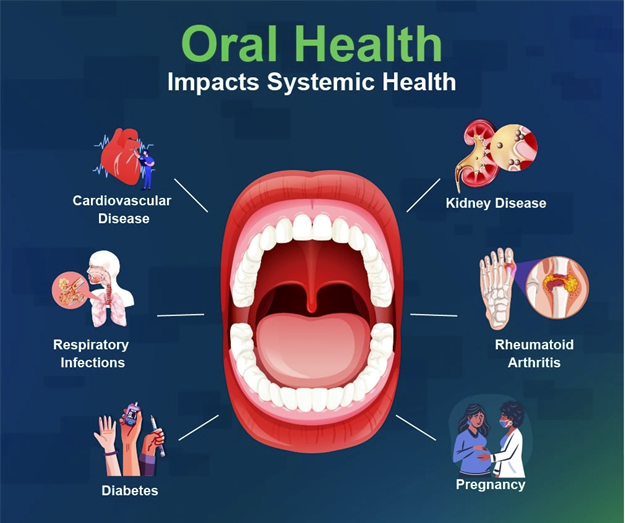
Every system within our bodies is connected, a fact that is often forgotten or unacknowledged when it comes to oral health. Although many people dislike attending routine dental visits, doing so is important because if an issue arises in your mouth, it can eventually impact another area of the body, such as your bones. So, to ensure that your body stays in good condition, it’s essential to communicate with your doctor and dentist.
Defining Health
Our health refers to our mental, physical, and social well-being. In other words, there is so much more to staying healthy than avoiding illness. Taking care of yourself in a multilayered task that, if prioritized, will help you experience life to the fullest and avoid serious conditions.
One of the best ways to do so is to schedule biannual dental checkups and cleanings with a dentist near you. Many people don’t realize that dentists possess detailed knowledge of oral health systems, including anatomical insight, how they develop and change as patients grow, and how your smile influences the functionality of other biological systems like the nerves, sinuses, and bones.
Breaking Down the Relationship Between Oral and General Health
Understanding the relationship between your smile and certain conditions can help you identify the measures needed to stay healthy and know when to seek out professional treatment. Some of these relationships are outlined in detail below:
-
Heart Disease
Cardiovascular disease and stroke are linked to poor dental hygiene. When excessive bacteria are present in the mouth and bloodstream, the body responds by triggering inflammation. Long-term inflammation can damage the heart’s lining, contributing to heart disease and stroke.
Patients dealing with gum disease, whether gingivitis or advanced periodontitis, are at a higher risk of developing heart disease. Common symptoms include red or swollen gums, pus forming around the teeth, a persistent bad taste in your mouth, and loose-feeling teeth.
-
Diabetes
Gum disease is also closely associated with diabetes. How? Poor oral hygiene and eating unhealthy foods, namely sugary items, not only contribute to cavity formation but can severely impact blood sugar. Research has found that high blood sugar levels can harm teeth and gums, leaving them even more vulnerable to inflammation, decay, and gum disease. Diabetes also slows down the body’s ability to heal, so if procedures are required, additional time to recover will be needed.
Frequent cleanings and evaluations are advised, which can help manage plaque and tartar, freshen breath, and maintain blood sugar levels.
-
Pneumonia
Excessive germs in the mouth can make their way to the heart and lungs. If left unaddressed, pneumonia can develop. Pneumonia is inflammation of the sacs in the lungs called alveoli. These sacs can fill with pus or fluid, leading to several painful symptoms such as fever, dry cough, and trouble breathing.
In severe cases, pneumonia can be life-threatening due the weakening of the immune system. So, it’s important to prioritize your oral health regularly. Brushing, flossing, drinking lots of water, and talking with your dentist are simple yet extremely effective strategies.
-
Pregnancy and Birth Complications
Dental health and pregnancy/childbirth have a unique relationship. One can impact the other, so it’s crucial to visit your dentist and doctor throughout the nine months. A woman’s eating habits before and during pregnancy can determine the amount of sugar and acids that remain on your smile and, if left unaddressed, enter your bloodstream. Patients can experience gum tenderness while pregnant, which can discourage brushing and flossing. In turn, tooth decay can develop as well as gum disease.
Mothers who have previously obtained silver amalgam restorations can be at a higher risk of mercury poisoning, and this applies to their babies as well. This is one of the many reasons why dentists have shifted to providing porcelain or resin restorations nowadays. Each of these materials is biocompatible and free of harmful metals.
-
Cancer
Since bacteria can easily move throughout the body, cancers can develop due to poor dental hygiene. Research studies have proven that patients currently dealing with gum disease, or those who have dealt with it in the past are at a higher risk of oral, stomach, and colorectal cancer. Even though we are still learning more about cancer, keeping your mouth clean is an easy technique to help patients of all ages stay healthy.
Furthermore, dental complications can arise after cancer treatment has begun. Chemotherapy and radiation are hard on the body, damaging the salivary glands that produce saliva to keep the mouth moist and wash away particles. Bone deterioration can also happen, leading to weakened jaws and difficulty eating, which, in turn, makes proper digestion hard.
Dentist in Millwoods advise annual oral cancer screenings. The screening takes just a few minutes to conduct. It is a preventative technique that enables dentists to detect unusual lesions tissue patches, and lumps in the mouth that may be cancerous. A biopsy (extraction and examination of cells) can be performed if necessary.
Come into Agape Dental Clinic for Quality Care
The skilled dental team at Agape Dental Clinic is here to assist you and your family. We emphasize daily hygiene and can provide tailored assistance to help patients reap the benefits of a healthy, beautiful smile. A range of preventative services are available at our practice, which are reliable and safe for all patients.
Our staff also believes in the power of dental education. We encourage questions of all shapes and sizes and look forward to helping you through this chapter of your smile journey. Connect with us to book a consultation and learn more about oral and overall well-being and how we can help you stay healthy.

